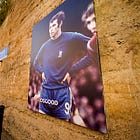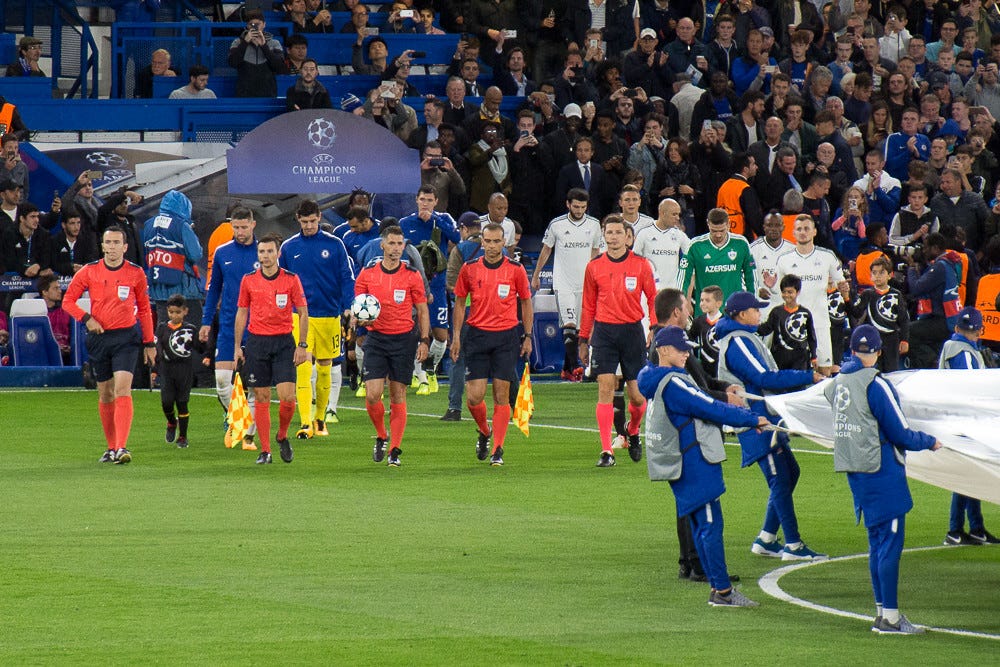Chelsea consistently on the losing end of inconsistency
Two of Chelsea's easternmost European opponents draw out the effects that double standards, caprice and luck exert on the Blues.
Londoners, geography buffs and Blues fans ever in search of one more chip on their shoulder know that Chelsea Football Club don't actually play in Chelsea. A similar subset focused on England's northwest know the same about Everton. Those stories of petty local politics and the founders' gumption to say "Right, then, we'll start our own" are far more genteel than the reasons why two of Chelsea's recent-ish opponents in Champions League group stages have a similar mismatch between the name on the badge and where they play their home games.
Shakhtar Donetsk has not been able to play in Donetsk since Russia invaded the Donbas region in 2014. They've called Kharkiv, Lviv, Kyiv and - for European competitions - Warsaw and Hamburg "home" since then.
Qarabag FK has been displaced even longer and, at least with regards to their birthplace of Aghdam, can never go home again.
More consistent transliteration would make it easier to associate Qarabag the football club with Karabakh the region and Nagorno-Karabakh the disputed semi-autonomous republic. But the different spellings make it easier to distinguish the two when writing about them, so we'll proceed with Qarabag being the football club and Karabakh being the region. That said, Qarabag left Karabakh during the First Nagorno-Karabakh War in 1993 and have been based in Baku ever since. As for their home, "[t]he entire town of Agdam is in complete ruins with the exception of the mosque in the center." Aghdam was considered a ghost town for nearly 30 years, until Azerbaijan reclaimed it in 2020.
Azerbaijan took charge of Aghdam as part of the resolution to the 2020 Nagorno-Karabakh war. The preceding sentence sacrifices a lot to convey a sense of beginnings and ends. As with Ukraine, it's not particularly useful nor accurate to think in terms of discrete events in 1993, or 2011 or 2014, or 2020, 2022 or 2023. Better to think of those as the years when frozen conflicts sublimated into violence.
Like Ukraine last year, Nagorno-Karabakh recently suffered another military incursion by its progressively encroaching authority-claiming neighbor. But unlike with Ukraine last year, neither the sports world nor the overseers of sport are doing anything to indicate they care, nor even using the conflict to give sportswashing cover (v2.0 style) to their score settling.
When is an oligarch not an oligarch?
"A corporate mogul whose business empire has won [contracts] worth billions of dollars... is tied to the president's family through secretive offshore companies."
Obviously, we're talking about Roman Abramovich and Vladimir Putin. That sentence could have come from any number of publications or official statements from the last 18 months: The Guardian, The Times, a Chris Bryant speech in Parliament, a press release from the UK, Canada or US trumpeting new sanctions of seizures.
Except it's none of those things. Literally none.
That sentence is from RFE/RL in 2013. The president is Azerbaijan's Ilham Aliyev, and the mogul is Hassan Gozal. Hassan Gozal is the CEO and his brother, Abdolbari, is the President of Intersun Holdings, the parent company of Qarabag FK. Within the power structure of Intersun, Abdolbari is also the president of Qarabag FK.
RFE/RL's description of Gozal's business practices and his relationship with Aliyev is nearly a find all-replace for Abramovich and Putin. Azerbaijan's policies and actions towards Nagorno-Karabakh since the fall of the Soviet Union are similarly interchangeable, mutatis mutandis, with those of Russia towards Ukraine. These players all show up in the Pandora Papers, outlining their holdings in the UK and UK territories such as the British Virgin Islands. The humanitarian crisis, marked in Nagorno-Karabakh by the displacement of nearly the entire ethnic Armenian population to Armenia, is a difference in scale, not degree; and is driven by a historically valid fear of genocide.
But the reactions vis-a-vis the sports world to events in Nagorno-Karabakh compared to Ukraine are, to use the phrase, chalk and cheese.
No ministers in Whitehall, functionaries in Brussels nor wonks in Foggy Bottom are calling on UEFA to suspend or expel Qarabag FK from the Europa League. No one associated with Qarabag FK is under any more sanctions now than they were last week, nor facing denunciations and property seizures. There's been no suggestion that Bayer Leverkusen, Molden or Haecken will or should boycott their upcoming Europa League group stage matches, wear an armband or laces in Armenian national colors, or take a knee at the opening whistle. None of UEFA's sponsors are convening meetings of their crisis comms and rapid response DEI teams to ensure they don't have any marketing or PR exposure to the events in Nagorno-Karabakh, leaving us to wonder if 3 would have bailed out as expeditiously as they did from Chelsea. Henrikh Mkhitaryan is not the automatic beneficiary of warm applause and sympathetic commentary, as Oleksandr Zinchenko and Vitaliy Mykolenko were in the back half of the 2021/22 season. Turkey is playing the role of Belarus in this conflict, yet there's no hint that Turkey's flag will be removed from Nations League graphics nor next to Caglar Soyuncu's or Hakan Calhanoglu's names on lineup graphics.
Why, the situation is being so thoroughly ignored that Mike Penrose hasn't been invited to set up a beautiful, tremendous charity staffed bigly with the absolute most brilliantly top men.
Not a phone call. Not an email. Not a nickel.
And for the most part, as an equally uncompromising advocate for the separation of sport and state as for judicial due process, I'm OK with all of that. If not for the Roman Abramovich precedent.
The hypocrisy isn't the worst part, because we're talking about warfare and potentially crimes against humanity. Other than those, Mrs. Lincoln, yes, the hypocrisy is the worst part.
Despite what my colleague Nate darkly desired, Chelsea were not put into administration in spring 2022. He'll have to find another source of hope than the prospect of fans (and supporters) and benefactors crowdfunding a phoenix club. It may be that, during ExpropriationFest 2022, Lord Richard Attenborough saved Chelsea one more time, posthumously, via the legal structure he helped create that separated ownership of the club from ownership of Stamford Bridge, ensuring the club will always have a home. That would be surprising inasmuch as it would show that the UK government still recognizes some limitations on its powers, even when intoning the word "oligarch." But just imagine what they would have done if Roman Abramovich had engaged in "tragedy chanting."
Chelsea fans are still connected to their club's history through more than a badge and memories. Nate might snort, "Lucky us." After the last two seasons, a lot of fans may share that snark.
Looking at the off-pitch events at Chelsea of the last two seasons, plus the plight of clubs like Shakhtar Donetsk and Qarabag FK, I share the statement but not the sentiment. "Lucky us," I lament, understanding that the one thing we as fans always expect to be there for us can be taken away from us so capriciously.
As much as I wish we could have some consistency in the performative gestures and retributive sportswashing that seem to afflict some sports and some clubs more than others, I don't want the Roman Abramovich precedent to be applied to other clubs. I can't believe I'm about to say this: not even Liverpool.
Instead, I'll return to something I wrote in January that, like so much else, events have increasingly proven right. The more closely you observe what's playing out around two of Chelsea's easternmost European opponents "the more it looks like the expropriation and forced sale of Chelsea FC was about Roman Abramovich and Chelsea first, Russia and Putin second, and Ukraine not at all."
Photo credit: cfcunofficial / Flickr, under CC BY-SA 2.0.





